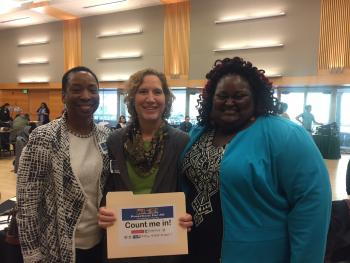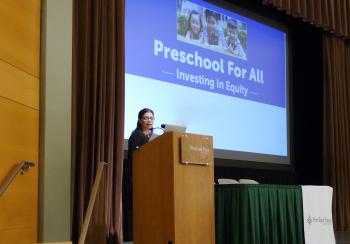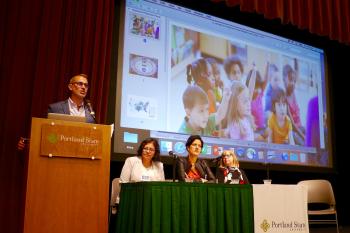Can we work together to make universal preschool happen in Multnomah County?
Last Friday, more than 250 leaders and practitioners raised their hands and said, “count me in.”
It was all part of a one-day, “Preschool for All” conference—organized by Early Learning Multnomah (ELM), Portland State University (PSU) and Social Venture Partners Portland (SVP)— to spark new, creative solutions that would improve preschool access and affordability for families.
One week later, our brains are still buzzing with insights, lessons, and inspirations from all the great speakers and attendees who so graciously shared their time and energy with us.
Here are a few of our main takeaways from the day.
Dozens of leaders pledged their support for universal preschool in Multnomah County.
More than 250 practitioners, providers, teachers, parents, nonprofit leaders, government officials and funders attended the event and said “count me in” to be a part of the ongoing conversation about universal preschool in Multnomah County.
We also heard from a host of local leaders throughout the day who pledged their support to make it happen:
“I will do anything my office can to help move this initiative forward.” – PSU President Rahmat Shoureshi
“This is a critical conversation to have and an important priority for Governor Brown.” – Miriam Calderon, Early Learning System Director
“Today is about acting, galvanizing, and emboldening ourselves to do something right here locally.” – Mark Halloway, CEO of Social Venture Partners Portland
“We’re going to get there because our kids are depending on us.” – Multnomah County Chair Deborah Kafoury
“We are poised to take leadership on advancing equity, access and excellence in early childhood education.” – PSU Graduate School of Education Dean Marvin Lynn.
Early Learning System Director Miriam Calderon urged Multnomah County to lead the way on universal preschool.
“Our public investments now don’t go far enough,” she said. “We have a system where your race and your income determine whether you get access to preschool or not. What you’re launching today is an opportunity to lead the way in our state.”
She went on to outline some of the main issues that a universal preschool solution should address:
- Our current system does not offer enough support to family, friend, and neighbor caregivers, not to mention professional development for all providers. We need professional development across the entire delivery system.
- We have a very limited supply of quality preschool options for families. About 65% of young children have two working parents and only one in four of those children can be supported by the current system.
- About 80% of the supply is in family child care, so we must make sure these providers are included in, not isolated by, the solution.
- We can’t forget about infants and toddlers and how shifts in the system might affect them.
Calderon also pointed to the statewide Preschool Promise program as a foundational model for universal preschool. “When family child care providers are a part of Preschool Promise, the quality we see is unbelievable,” she said. “That’s exactly the kind of system we need—we just need to do more of it.”
Leaders of universal preschool implementation in Denver, Seattle and San Francisco shared optimism and lessons learned.
Multnomah County Chair Deborah Kafoury facilitated a panel of early learning leaders who’ve had experience implementing universal preschool models across the country. Panelists Monica Liang-Aguirre (Seattle), Ingrid Mezquita (San Francisco), and Jennifer Landrum (Denver) were all at different points in implementation process, but they shared some great advice:
- You need teacher voice from the very beginning and consistently through the process.
“When you go too fast, you start losing lots of things, including quality. It’s about bringing a community together toward a larger vision,” said Ingrid Mezquita.
- Cultivating strong community leadership along with the right political leadership is a key to success, but striking the right balance between the two can be a challenge.
“When you have strong political will it’s great, but that also can mean that they determine the standards,” said Monica Liang-Aguirre.
- Be thoughtful about developing quality standards that are welcoming and inclusive of diverse providers.
“High quality can look different in different settings,” said Monica Liang-Aguirre.
- “Universal preschool” looks drastically different in different places. Decide what you mean in Multnomah County when you say “universal.” For example, do you start where the providers are most ready or where families are furthest from opportunity?
- Take your time and do it right.
“I think we were smart to call it a pilot and to go slowly. Give yourself time to prepare adequately so you’re not frustrating your community,” said Monica Liang-Aguirre.
- You will make your own mistakes.
“One ongoing issue for us is that early childhood funding is not systemic, it’s compartmentalized, so it increases the burden on the provider,” said Jennifer Landrum.
Inspirational speaker Dr. Christine Chaillé challenged us to make a “declaration of ignorance,” and move beyond what we think we know to create a solution that works for kids.
Christine Chaillé’s presentation was a refreshing balance to the more tactical advice we got from the three panelists. She asked us to think about what we mean when we say we are “investing in children” and why that investment has value. She challenged us not to think about early education as a passive, preparatory experience, but instead as an opportunity for each child to invent and discover—even when we, as adults, don’t fully understand where it leads. Just because we can’t directly measure or understand the value, she said, doesn’t mean it isn’t worth something to children.
Too often, as we grapple with big problems like this, we are trapped in a discussion about the future. We ask ourselves, “What do children need to have now to become graduates, college students, and competent workers later in life?” But, Chaillé urged that it is even more imperative to think about the value that these early learning experiences have for our children right now.
***
We look forward to seeing where this thoughtful advice takes us in the coming months.
Do you want to be a part of the ongoing conversation? Or simply stay informed? Send us a message and we’ll make sure to connect you to future events and opportunities.
For more information about the conference, go here.




